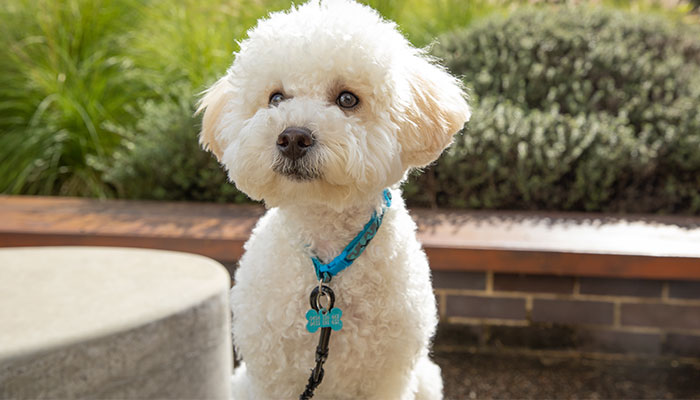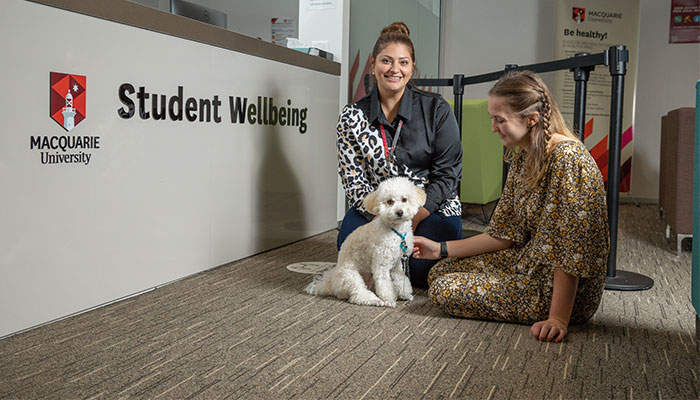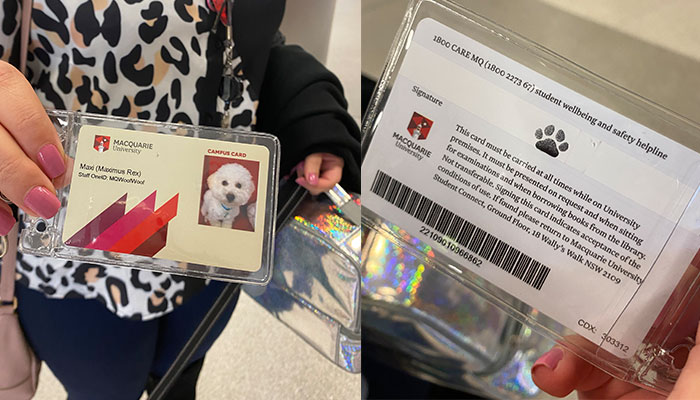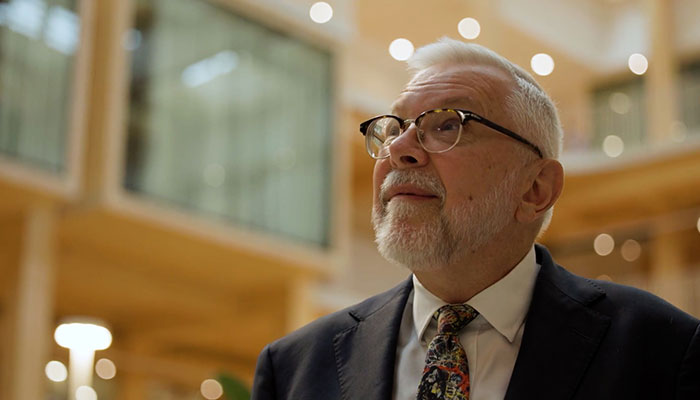Meet Maxi, the Macquarie University support dog in training. The seven-month-old ball of white, fluffy, hypoallergenic joy is proving his chops as a comfort-giver to students feeling anxious or stressed.

Puppy cuddles: Seven-month-old Maxi provides support to students who visit the Student Wellbeing Centre on the ground floor of the Hearing Hub building, 16 University Avenue. Image: Maja Baska.
“A student came in the other day, really distressed – we had triaged them and arranged an urgent appointment with a counsellor,” says Taleen Biberian, Maxi’s owner and Macquarie’s Wellbeing Services Co-ordinator. “While they were waiting we asked if they would like to sit with Maxi, and after a while they said: ‘Actually, I don’t need the appointment; I am going to go home and talk to my friends’.”
Maxi, a bichon-toy poodle cross, inherits his mantle from Snowy, who is remembered in a memorial sign that sits permanently on the reception desk at Student Wellbeing: “In loving memory of our furry friend. Snowy, 2007-2017,” it reads. When Snowy passed away, students sent flowers.
Research has shown that engaging with a dog can release the so-called ‘love hormone’ oxytocin, and lower heart rate and blood pressure.
“We would have signs up out the front saying there is a dog in there, if you are concerned let reception know and they can remove the dog, because some people are scared – but generally it was so well received it was unbelievable,”. Taleen says. “Students would come in, before an exam for instance, and say, ‘I just want to sit with the dog’.”
Mental health, financial hardship and accessibility support services
The Student Wellbeing office’s role is three-fold: it provides mental health counselling services; helps with accessibility for students with disabilities; and offers welfare support for students experiencing issues such as financial hardship, accommodation problems or abusive relationships. Typical concerns the students contact the office about also include academic performance, sexual assault or harassment, injuries affecting study, safety issues and legal concerns.
Maxi has been a presence in the office since he was a baby. By now he even has his own security pass, complete with a paw-print signature on the back.

Feeling good: Taleen Biberian, Maxi’s owner and Macquarie’s Wellbeing Services Co-ordinator (pictured) says little Maxi's presence in the office is a source of happiness for staff and students who use the service. Image: Maja Baska.
His employment is backed by science: research has shown that engaging with a dog can release the so-called ‘love hormone’ oxytocin, and lower heart rate and blood pressure.
After getting her new puppy last year, Taleen soon recognised Maxi had the qualities essential in a support dog – he was not a fearful pooch, and was warm towards people, sending out that “touch me, love me, rub me” sort of vibe.
- Creative Industries studios are the best in Australia
- How to find your people as a new student at Macquarie
At 10 weeks’ old he began coming to work with Taleen and has since been steadily building his skill set for meeting new people. Support dogs also need to be able to stay calm in a busy and loud environment, and to be managed with commands.

“Because we are still training him up not many people know about him as yet,” Taleen says. “He probably engages with two students a day; that’s based on our appointments which are still mainly over the phone at the moment.
“We are happy to start increasing that, it is not a problem. Whoever wants to come in, we will bring him out on his lead.”



